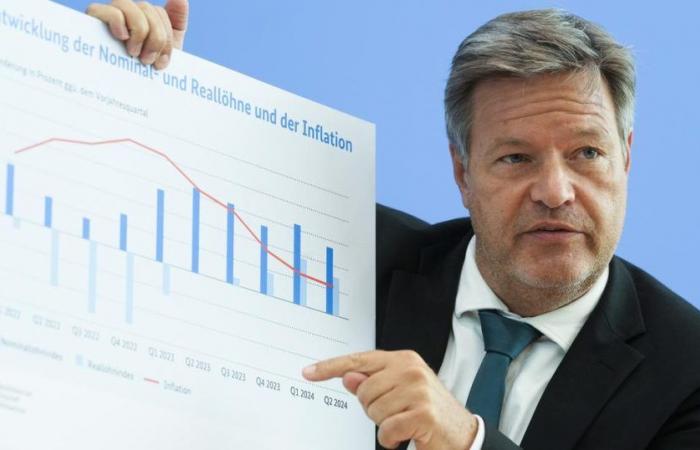The German government on Wednesday lowered its economic growth forecasts for 2024, predicting another year of recession. But he said he was optimistic about a jump starting next year.
Berlin now expects a decline in gross domestic product (GDP) of 0.2% this year, whereas it previously forecast growth of 0.3%. The GDP of Europe’s largest economy had already contracted by 0.3% in 2023. After two consecutive years of decline, it should however grow again next year, by 1.1%, then by 1.6%. in 2026, according to new forecasts [lire encadré].
This downward revision of forecasts comes after a series of bad news which weighed down Germany’s return to school, notably the freezing announced in September of a major factory project by the giant Intel in the country and the announcement by Volkswagen possible factory closures and layoffs.
>> Read about it: Volkswagen plans to close factories in Germany to cut costs
For the chief economist of the Sarasin bank Karsten Junius, interviewed Thursday in La Matinale de la RTS, the forecast error for 2024 can be explained because strong household consumption leading to a recovery had been envisaged. “It was not a totally unjustified expectation, because real household incomes increased this year. But they did not really spend this additional income. They mainly saved,” he explains.
Rise in protectionism
The German economy, which has long benefited from cheap energy thanks to Russian gas delivery agreements and dynamic exports, particularly to China, is bearing the brunt of the effects of the war in Ukraine and the weakness of global demand against a backdrop of protectionist tendencies.
>> Read: Europe facing the temptation of industrial protectionism
China and the United States, “our largest trading partners, are increasingly fragmenting open markets,” explained Economy Minister Robert Habeck. And “the American market is becoming more and more isolated,” he added, a phenomenon that has already occurred under the administration of American President Joe Biden. “The danger is very real that Donald Trump, if he is re-elected, will aggravate this conflict,” he fears.
Companies from the Middle Kingdom are taking more and more market share on a global scale “partly thanks to subsidies and partly because they have made up for their technological gap”, particularly in the face of Germany, which finds itself in a difficult competitive situation.
>> Read also: German growth, weighed down by its industrial sector, still at half mast in 2024
Structural challenges
Other structural challenges hit Germany, such as an aging population, burdensome bureaucracy and a complex ecological transition.
Despite the enthusiasm linked to Euro 2024 football and strong wage increases, private consumption remains weak due to a climate of uncertainty and rising unemployment, while external demand and restrictive monetary policy also weigh on activity, indicating continued weakness in the second half of the year, the Ministry of the Economy further detailed.
Interest rate drop expected
For Karsten Junius, the solution to these problems lies in lowering interest rates. “Rates at 4%, like today, are too high. Certain sectors are suffering, such as real estate and construction. Building permits for housing have completely collapsed in Germany,” he describes.
The European Central Bank is actually expected to cut rates next week, and likely several times over the coming months.
>> Read about it: The ECB cuts rates for the second time in three months
ats/vic/mf






